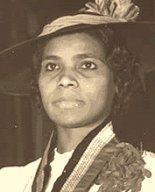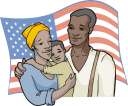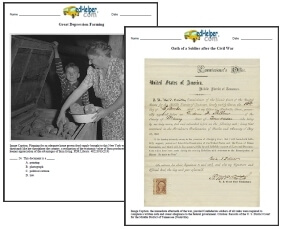
Worksheets and No Prep Teaching Resources
Black History and Blacks in U.S. History
 Worksheets and No Prep Teaching Resources Black History and Blacks in U.S. History |
Pioneers in Entertainment |
| edHelper's suggested reading level: | grades 7 to 9 | |
| Flesch-Kincaid grade level: | 7.84 |
| Print Pioneers in Entertainment (font options, pick words for additional puzzles, and more) |
| Quickly Print: PDF (2 columns per page) |
|
| Quickly Print: PDF (full page) |
| Quickly Print: HTML |
| Print a proofreading activity |
| Leave your feedback on Pioneers in Entertainment (use this link if you found an error in the story) |
|
Pioneers in Entertainment
By Sharon Fabian |

|
 1 Pioneers are brave people. They're not afraid to try new things. Whether they were pioneer families heading out west in the 1800s or modern day pioneers, these people have one thing in common - determination. They know what they want, and they have faith in their own abilities to get them there. They work hard, learn what they need to learn, and do what they need to do to achieve their goals.
1 Pioneers are brave people. They're not afraid to try new things. Whether they were pioneer families heading out west in the 1800s or modern day pioneers, these people have one thing in common - determination. They know what they want, and they have faith in their own abilities to get them there. They work hard, learn what they need to learn, and do what they need to do to achieve their goals. |
Create Weekly Reading Books
Prepare for an entire week at once! |
 |
Black History and Blacks in U.S. History
|
 |
United States
|
|
|
 | Fifty States Theme Unit |
 |
Document Based Activities |
|
Back to School Graphic Organizers Alphabet Worksheets Sight Words Math Worksheets Mazes 50 States Education Teaching Monthly Themes January February March April May June July August September October November December |
Fractions Place Value Time and Calendar Money Earth Day Solar System Analogies Nouns Following Directions Listening Capitalization Cursive Writing Patterns and Sequencing Dinosaurs All About Me Kindergarten First Grade Second Grade Third Grade Fourth Grade Fifth Grade Sixth Grade |
Multiplication Division Main Idea Cause and Effect Measurement Decimals Rounding Order of Operations Verbs Community Helpers Adjectives Plants Grammar Addition and Subtraction Contractions Bulletin Board Ideas Word Searches Crossword Puzzles Printable Puzzles Reading Comprehension Reading Skills English Language Arts |